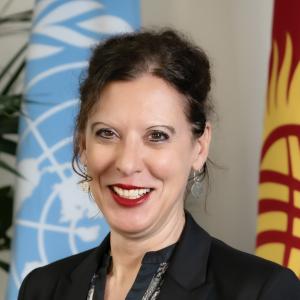Statement by the UN Resident Coordinator, Ms. Antje Grawe, for the official launch of the Joint Programme of the United Nations SDG Fund "Bridging the Digital Health Divide"
2 October 2024
Good morning excellencies, dear partners, dear colleagues,
It is a great pleasure to welcome you together with colleagues of UN Country Team at this launch of a Joint Programme of the UN system in Kyrgyz Republic “Bridging the Digital health divide in the Kyrgyz Republic”, funded by the UN’s Joint SDG Fund with generous contributions by EU, Sweden, Spain.
I’d like to start with congratulating the Kyrgyz Republic for receiving funding, already for the third time, from the UN’s global SDG Fund.
The SDG Fund, which was founded to accelerate SDG achievement across the globe through innovative and transformative investments, which has become even more pressing as SDG implementation is lacking behind, is highly competitive. For this funding round from a newly established digital window, Kyrgyzstan is among 13 countries worldwide to benefit from the investments. This stands for both the high quality of the submission, and the strategic foresight of the government’s decision-makers and the country’s strong commitments to SDG and the pledge to Leave no one behind. It also stands for the excellence and the collaborative spirit of the UN Country Team in Kyrgyzstan, which developed this Joint Programme, together with the Government and other relevant local and international partners.
Indeed, the Joint SDG Fund serves as an essential part of the United Nations Development System reforms. It is a global tool for Resident Coordinators and United Nations Country Teams to leverage financing, incentivize a scaled-up action at country level to achieve SDGs through collaboration amongst UN agencies, national partners and development partners.
I thank the major sponsors of the Digitalisation window of the Joint SDG Fund- the EU, Spain and Sweden – for earmarking their financial resources to make digital transformations at the local level possible.
Dear Friends,
In the 21st century, digital technologies are dramatically transforming our world. They offer immense potential benefits for the progress, wellbeing and advancement of people, societies, and for our planet.
This is what the Global Digital Compact which world leaders, including President Japarov, adopted at the Summit of the Future a little less than two weeks ago, calls for. The Compact aims to promote global cooperation to harness technologies to close the digital gap, eradicate poverty and leave no one behind in the world.
Emerging technologies, including artificial intelligence, play a significant role as enablers of sustainable development. The pace and power of emerging technologies create new possibilities. The health sector is not an exclusion. From generative AI to surgical robots, healthcare technology is a fast-moving vehicle for innovation. The use of digital healthcare technology can improve the quality of healthcare services and better serve patients. The AI in healthcare helps healthcare professionals do their jobs better and faster. And healthcare technology contributes to greening the planet. It is widely used in remote patient care that helps cut transportation emissions even further. Today, consumers are demanding that their healthcare be just as sustainable as their transportation, food, and housing.
Kyrgyzstan recognizes the transformative potential of digitalization. It adopted the Concept “Digital Kyrgyzstan 2019-2023", prioritized digital infrastructure development to improve digital services in various sectors, including healthcare. I am proud the UN agencies in Kyrgyzstan have responded to this national priority through various projects supporting their national counterparts with digital solutions. However, despite these strides, achieving countrywide connectivity is of paramount importance, particularly for rural communities and vulnerable groups, which account for two-thirds of the population.
This is why the Joint Programme was developed. The specific interventions of four agencies, including WHO as a technical lead, UNDP, UNFPA and UNICEF, aim to bridge the digital divide in the health sector by establishing a national, integrated digital health information system, thus reducing urban-rural disparities in healthcare access by making services, including telemedicine, accessible to rural, marginalized, and disadvantaged groups, particularly in mountainous regions, in full alignment with the Leaving No One Behind principle of the 2030 Agenda.
The Joint SDG Fund’s grant of $3 million for this Joint Programme will be complemented with more than 1 million $in co-funding, as well as more than $17 million in co-financing running in parallel to the JP. The results of the joint programme will benefit vulnerable people such as 120,000 persons with disabilities, 700,000 children aged up to 14 years at sub-national scale, 225,000 children aged under one year.
But the success of this Joint Programme will truly depend on many factors, including:
- our ability to create favorable conditions for introduction of telemedicine;
- improvement of the quality of internet connectivity throughout the country;
- increased and improved digital literacy of beneficiaries and providers of healthcare and social services, particularly in remote areas;
- dissemination of relevant mobile applications among the population.
- a cross-sectorial and multi-stakeholder approach.
With these conditions met, the programme will enhance equal quality healthcare provision for women and men, for mothers and children throughout the country.
As I look forward to the successful implementation of this Joint Programme with my colleagues from the UN System and all present in the room, I would like to conclude my statement with words by the UN Secretary-General:
“The digital divide is depriving billions of people of opportunities. Of education… Healthcare… Job opportunities… The tools to build a better life.
Bridging that divide is not only an economic necessity, but a moral and humanitarian imperative… We need to work together to build bridges…. Let us seize the moment and help ensure technology is put in the service of advancing the greater good.”
Thank you very much!
Speech by








